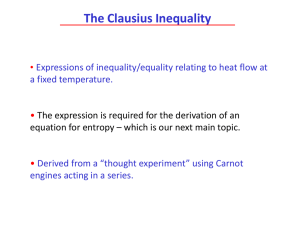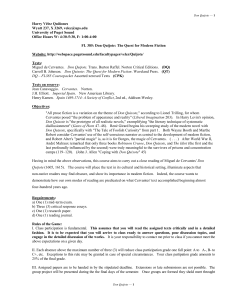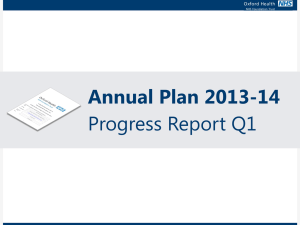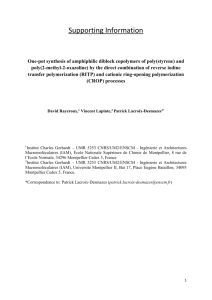Build Quality
advertisement
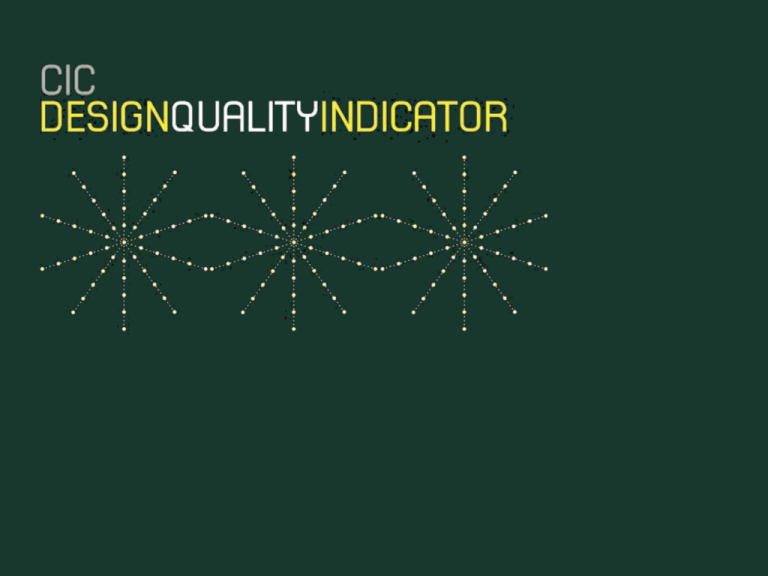
A brief history of the DQI • September 1999: development starts on the performance indicators for design • March 2001: version one of the Design Quality Indicator tool completed for testing • 8 July 2002: DQI Trailblazing Scheme launched • 1 October 2003: DQI Online launched • Now and future: continuous development driven by users of the DQI and feed into the debate on delivering excellent quality UK Construction Industry • Annual turnover £60Bn: 2M employed • 50% new buildings • Schools Programme £3Bn pa • Hospital/Health Programme £2.9Bn pa • Arts programme £350M pa • Housing programme £27.5Bn pa But will our children arrive every morning at a place like this…. Recently completed school (school ‘A’) main entrance Or this….? Another recent school (school ‘B’) main entrance Into a lobby like this….. School A - school street Or this…..? School D - entrance hall and school street Gather in a hall like this….. School A - main hall Or this…..? School C- Main Hall Will you go to a ward in a corridor like this? Hospital ‘A’ Ward corridor Or like this…? Ward Corridor in general hospital Nortaljie , Sweden Or this? Ward Corridor, Intermediate Care Centre, London Process Product Key Performance Indicators Design Quality Indicators Sustainability of Process and Product The DQI tool aims to help: • The client team to establish their aspirations • The design team to identify diverging views • A better understanding of what design is • Clients and designers to develop a shared language for the project And then • Measure the project’s success against those aspirations Fitness for Purpose Efficiency Effectiveness Visual Form Engineering Systems Sustainability Context Net to Gross Performance Location Robustness Access Attention to detail Kerb Appeal Space Standards Flexibility Comfort Aesthetics Cost in use Safety Air Quality Daylight Functionality Order Finishes Meaning Innovation Acoustics FUNCTIONALITY Delight Utilitas Venustas IMPACT Commodity Firmness Firmitas BUILD QUALITY Vitruvius & Wootton FUNCTIONALITY > Access > Space Form & materials > Internal environment > Urban & social integration > Character & innovation > Performance > Engineering systems > Construction BUILD QUALITY IMPACT > Use > Impact Functionality EXCELLENCE ADDED VALUE FUNDAMENTAL Overlapping quality fields Build Quality 6 Pilot Studies 86 Trailblazers 1200 users (and growing) Darlaston Leisure Centre • • Post occupancy evaluation of RIBA Award-winning Pool DQI highlighted strengths and weaknesses “… We've got the best baths in the area and people are coming from miles to use it.” (local user) BUT “..the gym overheats and the reception desk is very difficult to use.” (facilities manager) The DQI aims to 1. focus on comparison to help communication and encourage involvement within the project team 2. improve briefing 3. monitor and review design aspirations through the process 4. manage expectations by aspiring for quality and in the longer term 5. through benchmarking and cross comparison to correlate quality with factors in the procurement process to influence decisions for delivering excellent quality Wide Endorsement • • • • • • DCMS HM Treasury DTI OPDM OGC Strategic Forum for Construction • Prominent industry figures • RIBA • British Property Federation • NHS Estates • Major Contractors Group • The Audit Commission • BE • Constructing Excellence Board Quotes • Paul Finch, Deputy Chairman, CABE “The DQI helps the assessment of design in a constructive way, acknowledging that there are qualitative aspects capable of objective evaluation.” • Peter Gershon, Chief Executive, OGC “We have supported the DQI from the very beginning, because central government is committed to creating better public buildings” Quotes • Stuart Henderson, Deputy Chairman, CIC “Good design can optimise the resources deployed in any construction project adding value to buildings. CIC has drawn upon a wealth of experience in developing the DQI tool, all of this knowledge has been assimilated to form this excellent practical tool, DQI Online.” • Peter Rogers, Chairman, SFfC ‘‘The Strategic Forum for Construction fully supports the tool. In fact one of the key headline targets for the Forum is for 500 projects to have used the DQI by the end of 2004. By 2007 we are optimistic that usage will have expanded to 60% of all publicly funded projects.” Using the DQI Toolkit www.dqi.org.uk Some tips 1. This should be fun and the conversation between you is an important part of the process 2. Don’t score ‘Strongly agree’ on every line, imagine you only have €500 to spend… 3. If statement is irrelevant to you or your project then answer ‘Not applicable’ 4. If you don’t know about the statement then answer ‘Don’t know’ 5. You can ‘take a break’ and revisit it later 6. Use the ( ) information tips Weightings • weightings pages will appear at the end of each of the main sections and for the overall DQI • distribute the total number of points available between the aspects depending upon how important each aspect is to you • in the example on the next slide the respondent felt that for their building Functionality and Impact were more important than Build Quality WEIGHTING ALGORITHM DQI = F+I+BQ x www.dqi.org.uk VISUALISATION DATA COLLECTION TOOL Strategic briefing stage The British Library Centre for Conservation Design briefing stage Parliament Hill School Mid-design stage Doha Embassy In-use Peckham Pulse Healthy Living Centre w: e: t: www.dqi.org.uk dqi@cic.org.uk 020 7399 7424
